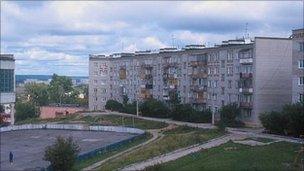Poland urged to act over old property claims
- Published

Jewish cemetery: The Nazis killed about 220,000 Jews in the Lodz ghetto
Poland is postponing moves to partially compensate families who lost property during the upheavals of Nazi occupation and communism.
Poland's chief rabbi, Michael Schudrich, criticised the government's decision to suspend work on a law designed to address the historical property claims of Jews and other Polish citizens.
"As a moral challenge, any government must face this challenge and should not walk away and I would hope that the Polish government could do the same," Rabbi Schudrich told the BBC.
Earlier this month the Polish treasury ministry announced it had completed work on a compensation bill but it would not be sent to parliament because it would add a huge 18bn zloty (£4bn; $6.3bn) to the public debt.
Poland's Prime Minister, Donald Tusk, said the decision would be reconsidered when Poland's financial situation improved.
Justice delayed
Stuart Eizenstat, the US state department's special adviser on the Holocaust, said the US was "deeply disappointed" by the announcement.
Nazi Germany exterminated about 90% of Poland's pre-war Jewish population of 3.5 million in World War II. The victims were stripped of their property, meaning there are now many claims from relatives.
But the Jewish claims only account for about 17% of the total. Most relate to Poles who lost property confiscated after the war by the communist regime.
The Polish Union of Property Owners estimates there are about one million claimants and the total value of compensation owing is 95bn zloty.
Ronald Lauder, President of the World Jewish Congress (WJC), said Poland was "telling many elderly pre-war landowners, including Holocaust survivors, that they have no foreseeable hope of even a small measure of justice for the assets that were seized from them".

In the communist era, private land was often used by the state for public housing
This criticism led Poland's Foreign Minister, Radoslaw Sikorski, to say that the US had given up its right to represent its citizens in such cases under a compensation agreement from the 1960s. He added that "a good moment" for the US to have helped Polish Jews was in 1943-44.
The WJC's Menachem Rosensaft responded by writing an article urging the Jewish community to "stop injecting tourist and other dollars into the Polish economy" until Poland enacted a compensation law.
The Polish media quickly labelled this a call for an economic boycott of Poland, which in turn prompted the WJC to announce that Mr Rosensaft was writing in a personal capacity and it did not advocate any such boycott.
Complicated cases
The heated exchanges show how sensitive the issue is.
Most European countries where this is relevant have already adopted legislation to provide either restitution of property or compensation for confiscations during the Nazi and communist eras.
Successive Polish governments have pledged to do so as well, but none have been successful. That is partly because of the scale and complexity of the problem here.
Not only was Poland home to Europe's largest Jewish community in 1939, but in 1945 the Allies agreed to shift Poland's boundaries westwards. That caused many Germans to lose their homes in Silesia and many Poles to lose theirs in what is now Ukraine, Belarus and Lithuania.
The controversy comes as Jewish culture and history is enjoying a boom among Poles. These days Poles attend Jewish film and cultural festivals, Hebrew classes or sing in Yiddish choirs.
Poland also enjoys very good relations with Israel. But the unresolved issue of property restitution is guaranteed to leave a sour taste.
- Published9 June 2010